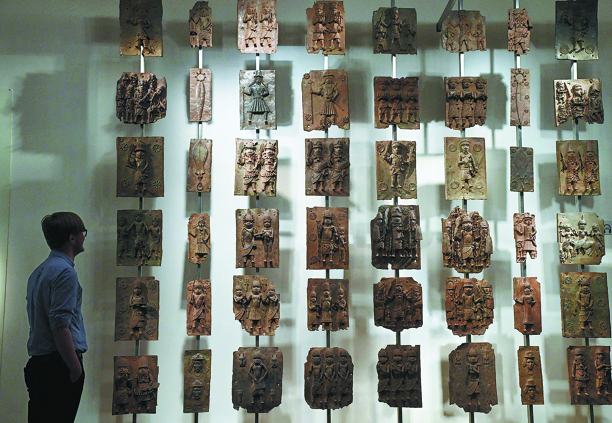Art in crisis: Thefts spark doubts over British Museum


Unfolding scandal
"One of the most insulting reasons that they've given is that the other countries that these items belong to would either not be able to take care of them or they are likely to be stolen," she said. "But you've got people in this country putting them on eBay."
Unsurprisingly, the Greek government has been watching the unfolding of the scandal closely, saying that it "reinforces the permanent and just demand of our country for the definitive return" of the marbles.
In an interview with newspaper To Vima, Greek Minister of Culture Lina Mendoni said the scandal brought into question the fundamental credibility of the British Museum.
"The loss, theft, deterioration of objects from a museum's collections is an extremely serious and particularly sad event," she said. "In fact, when this happens from within, beyond any moral and criminal responsibility, a major question arises regarding the credibility of the museum organization itself … the Ministry of Culture is following the development of the issue with great attention."
An unnamed Greek government official was quoted by the Financial Times as saying that the government "like others in the cultural community, are shocked by the scale of the theft … these issues have no direct bearing on our campaign for our legal right for the return of the Parthenon Sculptures to Greece, which continues unabated".
In addition to the current temporary exhibition, which ends in October, there are around 23,000 pieces from China among the British Museum's estimated 8 million items, with some there since its foundation.
Given the importance that has recently been placed on repatriating Chinese cultural artifacts that have ended up overseas, the saga has been followed with interest in Beijing. There has been no formal comment from the authorities yet, but there was a strongly worded editorial piece about the issue in the Global Times on Aug 28.
Emiline Smith, a fellow of the Centre for Criminology at the University of Hong Kong and a lecturer at the University of Glasgow in Scotland, told China Daily that although the initial story had taken her by surprise, given the museum's status as being the epitome of safe guardianship, it was less of a shock when more details emerged.
"It was clear that there was total lack of oversight and action contributing to an epic failure," she explained. "This isn't the first theft from a museum, and it's not the first insider theft either — anyone who's been in museum storage would know that things do go walkabout, and in this case, it was very clear that there is far too much in the collection for anyone to be able to control it effectively.
"It's a problem of documentation, but also a problem of funding in relation to the kind of oversight needed to avoid these things happening. In recent years, the former government's policy of austerity has clearly had a negative impact in terms of the loss of expertise and a weakening of the systems that could have prevented this happening, so it's quite ironic that the former chancellor of the exchequer George Osborne, one of the political architects of that policy, is now chairman of the museum, when this has emerged."
Although the British Museum had the misfortune to be caught out, other museums around the world, particularly ones with roots in colonialism, could face many of the same difficult questions.
In recent years, momentum has been building behind a wider global movement to repatriate items, and Smith said the publicity this incident has received had given that campaign renewed energy.
"It seems that for too long, the British Museum has been run by people who have regarded it as a private collection and think no one will ask any questions," she said. "It seems to have been operating on a too-big-to-fail mentality. This has been proven very wrong."
China is one of many countries that will be keeping a close eye on how the story continues to develop, given the amount of items of its own heritage that are in different hands and distant lands. But as Smith pointed out, its approach to repatriation so far has been distinctive.
"China has positioned itself slightly differently from other countries, as it's bought back items — normally countries of origin make a legal claim, involving law enforcement and suing, or go down the ethical route, making a public claim," Smith explained.
"Instead, China … has asked private donors to buy back objects, which are then reinstated through private museums, which has been effective — if Chinese items ever come up at auction, the room is sure to be full of Chinese buyers."


















